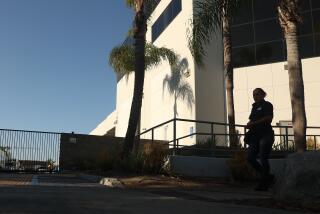Falling Asleep at the Switch : Millions of workers regularly doze on duty, and industry may be to blame.
- Share via
Nearly two-thirds of American industrial workers regularly fall asleep on the job, leading to safety risks and poor performance, according to the largest U.S. study ever on the subject. The brunt of alertness problems are borne by shift workers--electric utility operators, oil and chemical plant employees and factory workers who rotate through day, evening and night shifts at plants open around the clock--the study of 7,400 workers by three California researchers found.
The authors of the study, scheduled for release today at the annual meeting of the American Nuclear Society in Atlanta, take the nuclear industry, in particular, to task for failing to make the basic changes in scheduling and work rules that research and experience have found can reduce sleepiness on the job.
Like many employers, the study says, the nuclear industry has relied on overstaffing of shifts and disciplining of sleepy workers to combat job fatigue. “This approach is not working,” the authors say, “as evidenced by the high prevalence of sleepiness on the job.”
A series of disasters and near-disasters over the past 10 years has begun to increase American employers’ attentiveness to the problems associated with shift work, the irregular schedules worked by 25% to 30% of American employees.
$1.25-Million Fine
The accident in 1979 at the Three Mile Island nuclear plant in Pennsylvania; the release of deadly cyanide at a Union Carbide plant in Bhopal, India; the Chernobyl nuclear disaster in the Ukraine, and, most recently, the Exxon Valdez oil spill in Alaska, all occurred in the late night or early morning.
The Nuclear Regulatory Commission was spurred to action in part by the discovery in 1987 of snoozing operators at the Peach Bottom nuclear plant in southeastern Pennsylvania. The commission ordered payment of a record $1.25-million fine by the utility that runs Peach Bottom and kept the reactor closed for more than a year.
In January, the commission followed up with a policy statement requiring all utilities to foster a “safety culture” at nuclear plants and demanding that plant operators “be continuously alert.”
But the regulatory agency has not spelled out the steps utilities should take to achieve greater safety and alertness. And the new study’s principal author said in an interview that only a few nuclear plants have begun experimenting with the techniques--from nap breaks to adjusted work schedules to specialized training for shift workers--that can lessen the likelihood that employees responsible for critical tasks will doze off.
“If we have a problem, let’s try to look at some logical solutions,” said the researcher, Richard M. Coleman, a clinical assistant professor at the Sleep Disorders Center of Stanford University’s School of Medicine and president of a shift-work consulting firm, Coleman & Associates, in Ross, Calif.
The other authors of the study are William C. Dement, a behavioral physician and physiologist who directs the Stanford sleep center, and James B. Dillingham, a research associate at Coleman’s firm.
The researchers surveyed workers at 21 plants, asking how often they fall asleep during the course of a typical work week. They also asked if the workers had noticed bad or unsafe performance because colleagues were falling asleep. Most of the workers followed a rotational schedule in which they worked day, evening and night shifts in sequence.
Night Shift Worst
Among shift workers, more than 60% of those at petroleum and chemical plants and more than 50% of those at manufacturing plants and utility power stations reported nodding off regularly during stints of night-shift work. During day-shift assignments, between 27% and 35% said they fall asleep, depending on the industry. Sleepiness was reported to be less common--but still widespread--on the evening shift, when 17% to 28% of workers said they doze off.
By contrast, only 8% to 18% of workers on straight day shifts said they have ever fallen asleep on the job.
Shift workers reported that their co-workers’ fatigue hampers job performance and reduces safety. Between 50% and 70% said job performance in their plant is diminished by sleepiness, while 40% to 55%, depending on the industry, said they have observed accidents, near-accidents or poor safety practices.
Schedules widely used in American industry--rotating shifts with seven consecutive work days before time off--were associated with both the highest levels of sleepiness and the worst job performance and safety, according to the study. Schedules with no rotation through shifts or infrequent rotation, along with time off after five days of work, resulted in the greatest alertness.
Other sleep researchers said the new study’s findings are similar to those obtained by European and Japanese researchers studying smaller groups of workers, and to those of studies in which workers’ brain waves were monitored on the job to detect sleepiness.
The experts also agreed with Coleman’s recommendations for improving shift workers’ performance.
New Approach Taken
“We have to move away from just thinking in terms of discipline and staffing levels,” said Timothy H. Monk, director of human chronobiology research at the Western Psychiatric Institute in Pittsburgh. “We have to be a little more sophisticated.”
One nuclear plant that has begun exploring novel ways to keep operators alert is Pacific Gas & Electric’s Diablo Canyon facility, south of San Luis Obispo. Control room operators work 12-hour shifts, allowing longer periods of off-time between work stints. A stress-reduction class is geared to the problems of shift workers and their families, offering advice on diet and life style changes that can make shift work less grueling.
“We are vitally concerned about keeping our folks alert around the clock,” explained Edward Conway, manager of human resources at the plant.
More to Read
Inside the business of entertainment
The Wide Shot brings you news, analysis and insights on everything from streaming wars to production — and what it all means for the future.
You may occasionally receive promotional content from the Los Angeles Times.










